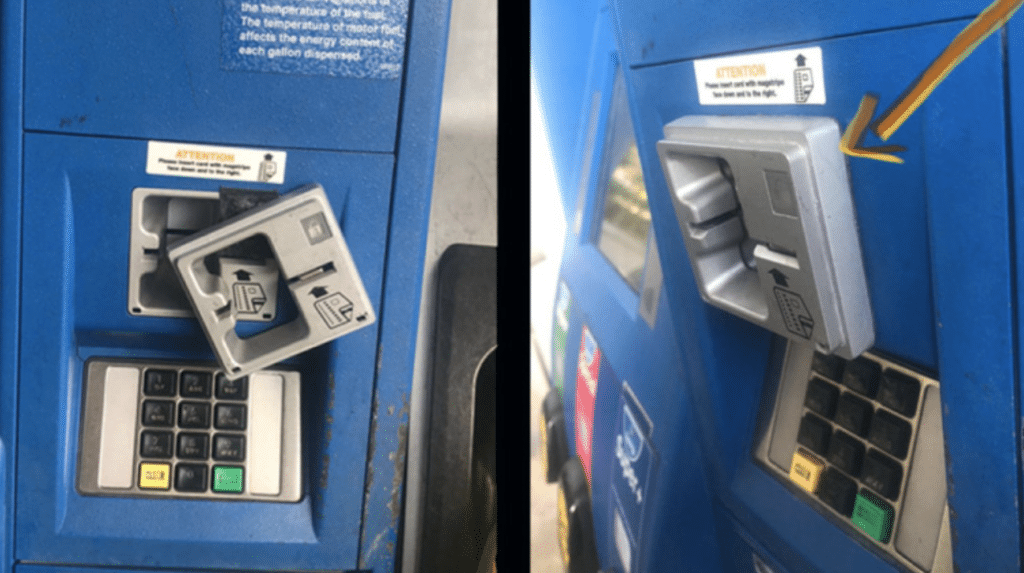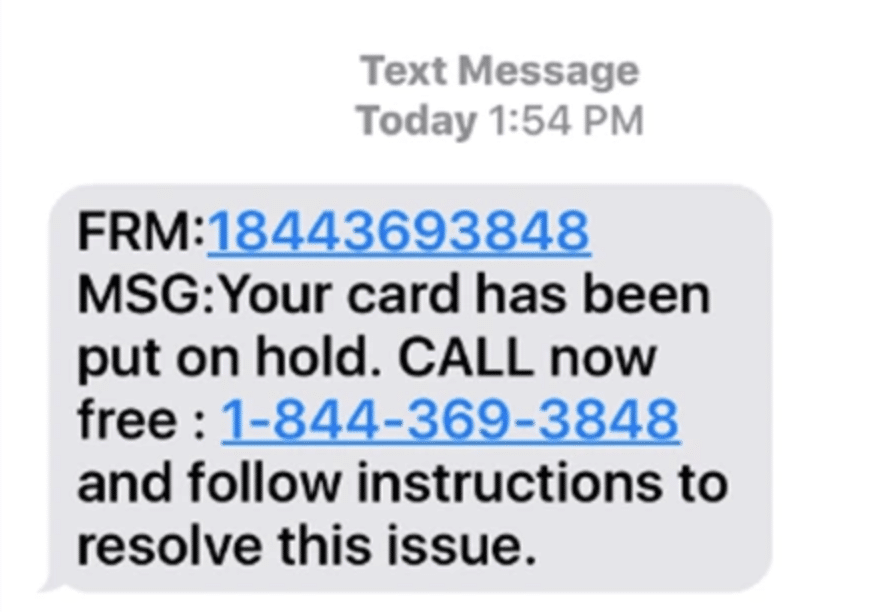Credit card scams continue getting more and more sophisticated every year. In fact, there’s a 46% year-over-year increase in fraudulent credit card transactions, which is why the US alone will experience over $12.5 billion in credit card fraud losses by next year.
But before a fraudster can attempt a fraudulent transaction, they need to steal the credit card information—and that’s where the scam comes into play.
Understanding how these credit card scams work is the first step in preventing them. Let’s take a closer look at the most common credit card scams we’ve seen so far this year and what you can do to protect yourself.
Public Wi-Fi Hot Spot Scams
Scammers are using malicious hot spots to steal credit card numbers—preying on people who connect to public Wi-Fi networks. And there are a couple of different ways that this can occur.
The first is pretty straightforward. You connect to a public network, and then you’re prompted to pay for access by entering your credit card number. Now the fraudster has your payment details.
Alternatively, the scammer could give you free access to their hotspot but then monitor your browsing activity. So if you purchase something online or access sensitive account information, they can spy on what you’re doing and steal your card information that way.
How to protect yourself:
Be very cautious when connecting to public Wi-Fi or hot spots. Only connected to trusted networks at locations with password-protected access. Never enter your credit card information and don’t access websites that require you to enter sensitive information or login credentials. You can use a VPN to help keep your connection more secure.
Credit Card Skimming
Credit card skimmers are devices that get placed on POS equipment where consumers dip, tap, or swipe their credit or debit cards. These skimmers are designed to blend into the real terminal so shoppers won’t think twice about using your credit card.
But once you pay, the skimmer steals your information.
How to protect yourself:
Skimmers are most commonly found on unmanned terminals, like a gas pump. You can inspect these terminals quickly to see if anything looks a bit off, and you can compare the way it looks to neighboring devices. Skimmers also come off pretty easily, so you can touch and feel the terminal before using your card to see if anything feels loose or out of place.
Identity Theft
Identity theft is a bit more serious than other credit card scams. Rather than simply stealing a credit card number, the fraudster opens new credit cards in the names of their victims.
This often happens if your social security number is compromised along with other sensitive personal information.
The root cause of identity theft can vary—ranging from database breaches to phishing scams, stolen mail, and spyware.
How to protect yourself:
Set up fraud alerts and credit monitoring with the major credit bureaus (Experian, Equifax, and TransUnion). Check your free credit reports on a regular basis to see if any new lines of credit have opened in your name. You can also put a “freeze” on your credit file to block any new credit cards from opening while the freeze is turned on.
Email Phishing
More than 3.4 billion phishing emails are sent every day. These emails used to be pretty easy to spot. But with advancements in technology, cybercriminals are getting better at fooling email spam filters and impersonating legitimate emails.
I’ve actually come close to getting fooled myself a few times with email phishing scams, as they’re becoming harder to spot.
Messages are crafted in a way that lures recipients to click a link and then asks them to enter sensitive information—like a credit card number.
How to protect yourself:
Never click a link in an untrusted email. Look closely at the sender’s email address and reply address, not just the name in the “From” line. For example, you may think an email is coming from Amazon, but if you look closer at the sender’s email address, it might be a random string of letters and numbers at Gmail—which is obviously not from Amazon.
Don’t rush when you’re reading through your emails. If there’s lots of spelling errors, grammatical issues, or something feels “off” then it’s probably a scam.
Never call the phone number in a suspicious email. For example, let’s say you get an email from someone claiming to be a representative for AT&T about a past-due bill. Rather than calling the number on that message or clicking a link in the email, you can go directly to AT&T’s website or call the number that’s printed on your latest invoice.
SMS “Smishing” Scams
The term “smishing” is just a combination of SMS and phishing. It’s the exact same concept as email phishing, except it’s done via text message.
You’ll get a text sent to your phone prompting you to click a link or call a phone number—with a scammer on the other end attempting to steal your information.
Most SMS smishing attempts create a sense of urgency. They’re crafted in a way to get recipients to act quickly because they think something is wrong, like this example:
How to protect yourself:
Don’t click any links sent via text from an untrusted number. Always Google search the phone number to see if it corresponds with the actual phone number of a legitimate business. To be safe, go directly to that company’s website to contact them directly as opposed to using the contact info provided in the text.
Social Security Benefits Scam
This is a common credit card scam because it typically preys on older individuals who are currently in retirement or receiving social security benefits.
These scams are commonly done over the phone, where a caller says that social security benefits will be halted or suspended until a payment is made—and then asks for your credit card number.
How to protect yourself:
The Social Security Administration won’t contact you to ask for your credit card number (or your SSN). So if someone calls, emails, or texts you claiming to be from that office, it’s a huge red flag. Hang up and don’t give them any information.
Threat of Arrest Phone Call Scam
This credit card scam is meant to alarm you. The scammer poses as a law enforcement agent and threatens to arrest you for some unpaid fine, tax, or outstanding warrant.
They attempt to instill fear and urgency, insisting that an immediate payment can prevent this supposed impending arrest. It’s designed to catch you off guard and coerce you into making a rash decision.
How to protect yourself:
Law enforcement officers and government agencies will never call you to threaten arrest over the phone or demand payment. This is always a scam. But if you’re concerned it’s legitimate, just hang up and contact the agency directly using their official number—not the one provided in the scam.
Charitable Donation Scams
Charity scams are more prevalent immediately following a natural disaster or global crisis. Fraudsters set up a fake charity to solicit donations via social media, email, or phone calls.
Unfortunately, that money doesn’t end up going to the intended cause—but instead lines the pockets of the fraudsters.
How to protect yourself:
Conduct thorough research to ensure the charity is legitimate. And always donate through official charity websites or platforms. For example, someone calling claiming to be from the American Red Cross (a legitimate organization) may not actually be a company representative.
Spyware
Spyware is a type of malicious software that gets installed on your computer or smartphone without your knowledge. As the name implies, it spies or monitors your online activity to steal sensitive information.
If you’re infected with spyware and you enter your credit card number into a website, the scammer can see your every movement and key stroke.
How to protect yourself:
Spyware typically infiltrates systems via email attachments, downloads, and compromised websites. Be very cautious when clicking links from unknown sources, senders or sites. You should also use a reputable antivirus software and keep your operating systems up to date so they can fight against the latest spyware and cybersecurity threats.
Interest Rate Reduction Scams
This scam typically targets people with debt. The scammer contacts you and claims they can significantly lower the interest rates you’re currently paying on a loan or debt.
They’ll claim to save you thousands, or even tens of thousands, just for a small fee.
But they never actually deliver on those promises and end up stealing your credit card number and personal information in the process.
How to protect yourself:
Always be skeptical of unsolicited offers to lower your credit card interest rates. If it sounds too good to be true, it usually is. Never share your credit card number or personal information with an unsolicited caller.
Rewards Winners and Fraudulent Sweepstakes
Sweepstakes scams typically come as a phone call, email, or text. They claim you’ve won some type of prize or award—but to claim your winnings, you need to pay a fee or provide your credit card number to “verify” your identity.
Obviously, there’s no award or prize. The scammers are just out to get your personal financial information.
How to protect yourself:
Legitimate sweepstakes and contests won’t require winners to pay upfront fees. And if you don’t remember entering the contest, then it’s probably a scam.
Overage Charge Scams
In this scam, you’ll be contacted by a “business” that says you’ve overpaid for something. But they need to verify your credit card number to process the refund.
How to protect yourself:
Typically, a legitimate merchant won’t need your card number to process a refund. You should also be hesitant to provide any information about a purchase or transaction you don’t remember making.
Timeshare Exit Scam
In this scenario, fraudsters prey on those looking to sell their timeshare properties. They often promise a quick sale, but require you to pay a “tax” or “fee” upfront.
But this is just an attempt to either steal your money, steal your credit card information, or both.
How to protect yourself:
Quick timeshare sales that sound too good to be true are probably a scam. If you’re contacted by someone who wants to purchase your timeshare, conduct thorough research before committing to anything or providing sensitive information.
Romance Scams
With online dating on the rise, we’ve recently seen an uptick in these romance scams.
The scammer preys on someone looking for love or a relationship. They often wait weeks or even months to establish trust with an individual, most often someone who they haven’t actually met in person.
But once trust has been established, they make up a fake crisis or emergency and ask for financial help.
How to protect yourself:
Proceed cautiously with any online relationship—especially with someone you’ve never met. Never share your credit card information or make a payment on behalf of someone you’ve met online.
AI Impersonation Scams
Advancements in AI technology have made it easier for scammers to create convincing audio that mimics the voice of a loved one or public figure.
For example, a grandparent might receive a phone call from someone who claims to be their grandson. But it’s actually just an AI-generated voice.
How to protect yourself:
Be skeptical of unexpected requests for money, personal information, or phone payments—even if they’re coming from a familiar voice. You should hang up and verify the request by contacting the person directly, using a known phone number or trusted channel.
Final Thoughts
Staying informed and vigilant is your best defense against credit card scams. If it seems suspicious, it usually is.
Always take a minute or two to think about what’s happening before you provide any sensitive personal information or credit card details.
If you suspect that your credit card information has been compromised, contact your card issuer immediately to report it.



